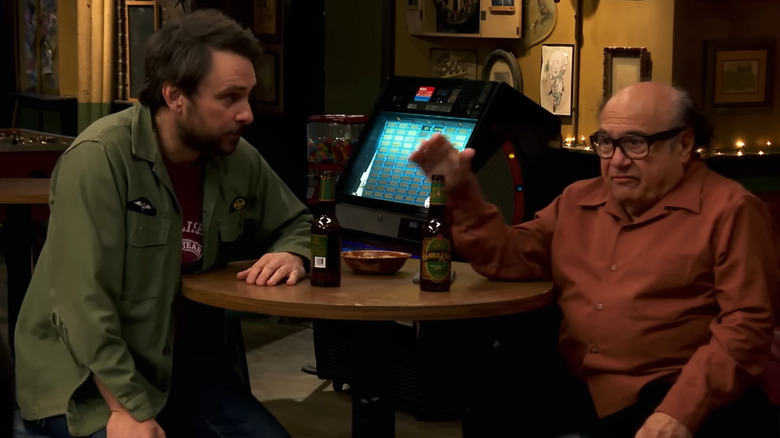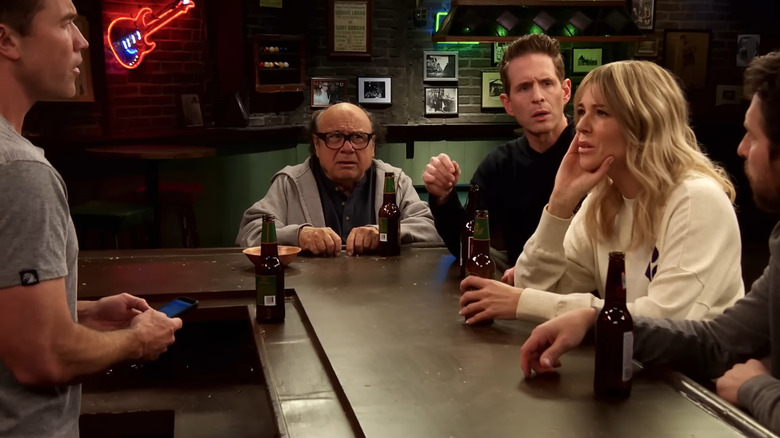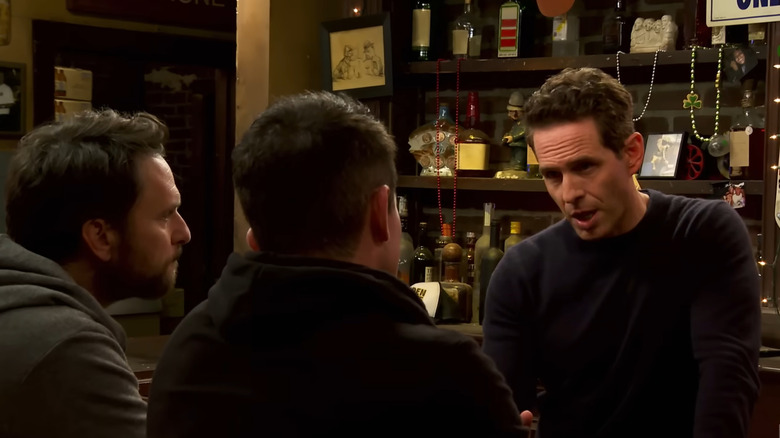The Gang Still Doesn't Understand How Finances Work In It's Always Sunny In Philadelphia Season 16
On "It's Always Sunny in Philadelphia," all of the characters have their own unique traits. Dennis can't relate to regular people on account of his sociopathic tendencies, Frank is incapable of restraint, Mac's a child, Dee gets blindingly over-confident whenever she even suspects she's about to win something, and Charlie can't read.
But on the other hand, each character gets to be good at something every once in a while. Charlie's a talented musician, Mac's a talented dancer, and Frank sometimes gets to have good business sense. This is made clear early on in the season 16 premiere where Frank, and only Frank, is shown to have a decent understanding of inflation. "Inflation is when the price of goods and services goes up," he says, and the rest of the gang nods along as if they're capable of following.
Of course, the cracks in Frank's knowledgeable façade start showing the moment Mac and Dennis try to use inflation to ask for a raise. "If I raised your wages, then you'd have more money, and that in this case is not good because it would increase inflation," Frank explains. On a large scale, there's arguably some merit to this, but the idea that raising just four people's wages would have any effect on a nationwide trend? That doesn't hold up. Things get more ridiculous when Frank tricks Mac into giving him one dollar in exchange for fifty cents. Because of inflation, Mac's led to believe, this is a good deal.
This is only the opening scene, but already the episode sets up the groundwork for what the main story will be about: the rest of the gang desperately tries to make some money, and Frank takes advantage of them.
A familiar storyline
Frank's always been a little immoral, but when "The Gang Inflates" reveals that he's bought Dee's apartment building and is personally responsible for the rising costs that led to Dee getting evicted, it's hard not to wonder if he's gone a little too far this time. Things escalate further with the reveal that he's only agreed to fund Dennis and Mac's inflatable furniture business because he knows they'll fail, and he'll get to exploit them forever as a result.
It all works as a spiritual sequel to the 2009 episode, "The Great Recession." There, Mac and Dennis didn't sabotage themselves with a furniture store, but instead tried to game the system with "Paddy's Dollars," their own pub-specific currency that didn't actually make any sense. You'd expect Dennis to be the reasonable one explaining to Mac why this is a bad idea, but he's not; he's just as delusional and out of his depth as his partner. In the 14 years between "The Great Recession" and "The Gang Inflates," neither character has grown wiser or more self-aware. Usually that lack of character development would be a problem, but for "Always Sunny" that's part of the show's charm.
And of course, just as "The Great Recession" resolved with Frank inexplicably receiving a government bailout, the gang's money woes in this episode are resolved by Frank's surprising lust for Teenage Mutant Ninja Turtle pies. Charlie plays Frank like a fiddle, only giving him the pies when he agrees to un-evict Dee and forgive Dennis and Mac's loans. Frank hasn't changed — he'll always be a selfish business predator in a never-ending pursuit to exploit the people around him — but for now, at least he's been kept at bay.
What else is the show predicting?
"The Great Recession" unexpectedly became relevant again in recent years, because the Paddy's Dollars subplot can so easily be seen as a metaphor for crypto-currency. Like what happened to Mac and Dennis, most crypto-currencies have turned out to be confusing, morally dubious, and all but certain to blow up in a lot of people's faces. That's the direction Charlie's scheme with the TMNT pies seemed to be heading, but just as crypto-currency has gone mainstream in recent years, Charlie's take on Paddy's Dollars 2.0 is a little more successful this time around. "The Gang Inflates" seems to argue that Mac and Dennis's 2009 scheme wasn't actually that silly; they were just a decade or so ahead of the curb.
That raises the question: what else is the gang right about? Will renting couches instead of buying them become a common practice soon? Will inflatable furniture turn out to be far more lucrative a business than this episode implies? Perhaps Dee's strategy of gluing herself to things will skyrocket in popularity. It's currently already somewhat popular as a protest method, but less so as a successful strategy for evading an eviction. As much as "The Simpsons" gets credit for predicting future events, maybe it's "Always Sunny" that'll end up earning this reputation more. If door-to-door gasoline salesmen become a thing, we'll certainly know who to blame.
New episodes of "It's Always Sunny in Philadelphia" season 16 air weekly on FXX at 10 pm ET, and are available the next day on Hulu.


